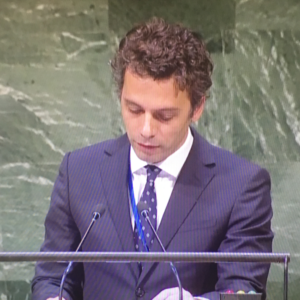 Report of the International Court of Justice (1 August 2017 – 31 July 2018) at the Plenary Session of the United Nations General Assembly
Report of the International Court of Justice (1 August 2017 – 31 July 2018) at the Plenary Session of the United Nations General Assembly
United Nations, 25 October 2018
Mr. President,
It is a privilege to address the General Assembly on its consideration of the Report A/73/4 of the International Court of Justice. We are grateful to President, Judge Abdulqawi Ahmed Yusuf, for his introduction of the report and for his insightful remarks on the work and functioning of the Court.
During the period under review, the International Court of Justice once again experienced a particularly high level of activity delivering judgments in 4 cases, issuing 13 orders, holding public hearings on 3 cases, and was seized on other 5 new contentious cases. Despite this high level of activity, there are currently, another 19 cases that are pending before the Court.
This consistently high workload demonstrates the confidence placed in the Court and the respect shown for it by States. Such trust is reiterated in resolution 71/146 in which the General Assembly emphasized “the important role of the International Court of Justice, the principle organ of the United Nations, in adjudicating disputes among States and the value of its work, as well as the importance of having recourse to the Court in the peaceful settlement of disputes”.
The considerable growth of the Court’s workload over the course of the last 20 years stands as a proof that States will not hesitate to turn to the Court to seek clarification on the law and, particularly, in times of crisis or when their rights are at risk of irreparable harm. It is essential that the Court’s work should be facilitated and supported by all Member States and the Court should have at its disposal the necessary resources in order to be able to mobilize in a timely manner and effectively address such requests.
Mr. President,
Resolution 71/146 further recalled that “consistent with Article 96 of the Charter, the Court’s advisory jurisdiction may [also] be requested by the General Assembly, the Security Council or other authorized organs of the United Nations and the specialized agencies”.
In this regard and in the spirit of upholding the Charter of the United Nations, the Republic of Cyprus participated in the written and oral proceedings in the request for an advisory opinion, Resolution 71/292, tabled by the Africa Group and adopted by the General Assembly on the Legal consequences of the separation of the Chagos Archipelago from Mauritius in 1965. The hearings have been completed and the judges will deliberate on the General Assembly’s request for clarification for all UN Member States on important issues of decolonization, including the right to self-determination and territorial integrity.
Mr. President,
The Republic of Cyprus is one of 73 States which have made a declaration, some with reservations, recognizing as compulsory the Jurisdiction of the Court. In this context, the Republic of Cyprus stresses the importance of reassuring that the decisions of Court are universally accepted and implemented, by all Member States, without any exceptions or on a selective basis.
The Court’s jurisdiction is further complemented by the more than 300 bilateral or multilateral treaties or conventions provide for the court to have jurisdiction ratione materiae in the resolution of various types of disputes, its prorogated jurisdiction, as well as its jurisdiction in advisory proceedings.
The Republic of Cyprus reiterates its call so that all States that have not yet done so to recognize the Court’s jurisdiction in accordance with the Article 36 of its Statute, thereby promoting and facilitating the International Court of Justice’s ability to maintain and promote the Rule of Law throughout the world.
I thank you for your attention.